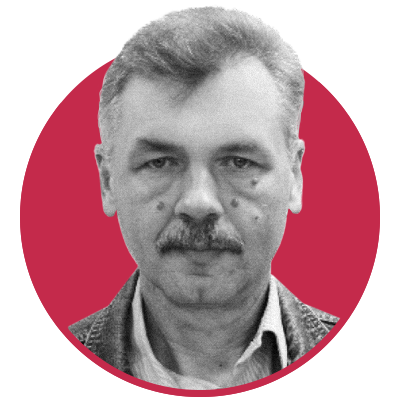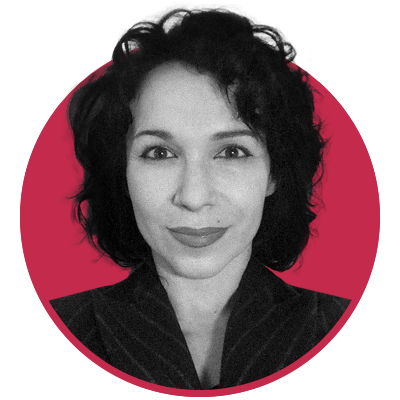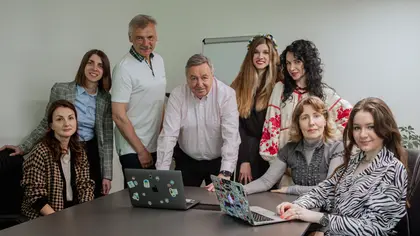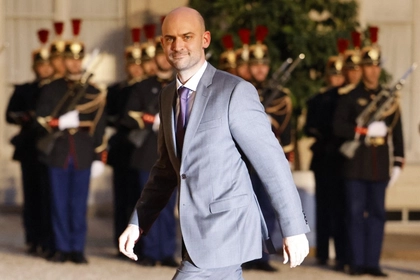On 23 May the Ukrainian version of Kyiv Post celebrates its first anniversary. Despite Russia’s full-scale invasion, we managed to launch the Ukrainian version of Kyiv Post. We thereby fulfilled the dream of the owner of the newspaper, the well-known Odesa businessman and philanthropist, Adnan Kivan. We are grateful to him for his vision, support and inspiration!
This year, we have worked under rocket fire and drone attacks, Russian missiles exploded near our office, we hid in shelters, worked without electricity, but we did not stop for a minute.
JOIN US ON TELEGRAM
Follow our coverage of the war on the @Kyivpost_official.
We continued to write, report, and analyze. It’s important for us that our readers have access to important information about Ukraine not only in English but also in Ukrainian.
To mark this day, our journalists and editors tell us how they remember this challenging but historic year.
Thank you for being with us this year and becoming part of the Kyiv Post community.
Allow me to introduce Kyiv Post Ukrainian version’s team:
Maryna Shashkova, journalist (helped in the development of the Ukrainian version of Kyiv Post)

Kyiv Post is a media outlet that tells the whole world about Ukraine. Every day our audience is growing, and this gives us an understanding that Ukraine is on the agenda for people around the world.
And we also appreciate that our readers like our work and recommend us to their friends as the best English-language Ukrainian publication.
![[VIDEOS] North Korean Troops in Russia Confirmed](https://static.kyivpost.com/storage/2024/10/19/a6f6a4c5d74d066019e5812a20c6514f.png?w=420&q=75&f=webp)
[VIDEOS] North Korean Troops in Russia Confirmed
However, it’s equally important that our Ukrainian-speaking readers can enjoy our materials in Ukrainian. We have been working on this for a year now.
Every day we publish the most important news and articles about events that shape the agenda of the country and the world. We keep in touch with our readers via our Ukrainian Kyiv Post Facebook page.
We’re pleased to see your comments, your appreciation and your criticism. It encourages us to keep going and move forward.
Andriy Bondar, editor

Exactly one year ago, the Kyiv Post opened a new page – the Ukrainian-language edition. Looking back at the first published articles in the archive, I recall those difficult, nerve-wracking, but dynamic and interesting first days of the new team’s work.
Back then, in May, embassies were reopening in Kyiv, and the capital was gradually filling up with people and cars, coming back to life. But there was also a painful awareness that the war would not end soon.
There was bitterness and anxiety for the defenders of Azovstal who were forced to surrender, and for the hundreds of thousands of civilians who found themselves under Russian occupation.
We already knew what it was like from the example of Bucha, where bodies continued to be found almost two months after its liberation...
There was also an understanding of the importance of the work we were honored to undertake in the newly created Ukrainian edition of the Kyiv Post – work on the so-called “information front.”
But this is an oxymoron because, in our Ukrainian reality, it’s wrong to say “information front,” “economic front” or “cultural front.”
The front is where our defenders fight, looking death in the face every day. We are the information rear, and here we are working for victory.
I recall a photo published last summer: a Ukrainian soldier in a trench browsing the Kyiv Post website on his smartphone – and I am proud that we are doing the right thing.
Anna Nepliy, journalist

Soon after the anniversary of the Ukrainian edition of the Kyiv Post, I’ll be celebrating the anniversary of my employment at the Kyiv Post. And for me, this is a special date, because working as a journalist at this publication is much more than just a job.
Firstly, it’s an opportunity to keep a watchful eye on the information front, representing Ukraine's voice and interests in the international arena.
In addition, it’s a great opportunity to introduce Ukrainian society to its own culture, history and traditions, debunking stereotypes and labels imposed by the Soviet Union and later by Russia.
However, the most important aspect for me is the struggle for truth and justice within the country. Four years ago, when I chose to become a journalist, I was motivated by the desire to change my country for the better.
After all, if I want to live happily here, I have to take care of my home. And real journalism is actually the fourth estate. So, I am glad that the Kyiv Post, including the Ukrainian edition, shares my ideology and we act as a real team.
Last but not least, Kyiv Post has become my second home. This is where I spend most of my time.
And the main thing is that I really enjoy coming to work, even when I could work remotely. That’s why I don't like to be sick – because I feel very sad at home without my team.
Vita Demus, SMM Manager

Three months ago, we created the Kyiv Post’s Ukrainian-language Facebook page, which has already attracted more than 50,000 followers, and the community's posts have reached several million users.
I am glad that I have the opportunity to be involved in this page of Kyiv Post’s history and believe that together with the team we will be able to achieve increasingly better results.
Sharing quality content on social media is an opportunity to speak to a large audience and receive instant feedback from readers.
Marichka Palamarchuk, journalist

The Ukrainian Kyiv Post was launched in hard times.
My job was to cover cultural events and it was quite challenging at first because I was in a state of stupor – like the majority of Ukrainians. An active participant in cultural life before the war, I had not listened to music, watched movies or laughed for months.
I had only been following news of the war around the clock. I was not even aware of my state of maximum nervous strain.
The work for the Ukrainian Kyiv Post brought me back to normal life and this experience helped me realize how important it is for people to get positive news and some distraction.
My first article was about Ukrainian standup comedians performing in wartime. I remember the day I went to listen to jokes wondering how one could laugh amidst all those horrors of war. Strangely, I found myself laughing – for the first time in months – because I recognized myself in every joke!
My own laughter woke me up and made me feel alive. There and then I learned that positive news has great therapeutic power, so I began to hunt for that kind of news in order to distract my traumatized compatriots.
We are living in an age of information and the whole world is watching closely the formidable developments in my country. That’s why I want to tell the world about our rich and beautiful culture, dramatic history, talented artists and brave heroes.
Thanks to Kyiv Post, I enjoy doing my job with a team of professionals who have become one family.
Tetiana Doroshenko, editor

Working at KP has allowed me to combine my interest in well-written texts (as part of a broader interest in good literature) with my interest in politics quite harmoniously for a year now. For as long as I can remember, I have been interested in both of these fascinating areas of human culture.
A year ago, my colleagues and I from the editorial department of the then newly-created Ukrainian edition assigned ourselves the task of setting the right tone for the Ukrainian-language Kyiv Post.
“Right” mainly in the literary sense: stylistically, lexically, semantically, and even in terms of grammar.
The most experienced professional journalists are engaged in the actual journalistic editing, which is not my area of expertise.
I wanted our posts to be not only topically relevant, informative, and unbiased, but also written in modern, dynamic Ukrainian, easy to understand for readers of any level of education.
Throughout this year, we, the literary editors (as I call this function), have been trying to eradicate typical journalistic “jams” as gently as possible: clichés, state bureaucracy, puffed-up pathos, tautology (or, conversely, logical breaks, inconsistency in the presentation of our theses).
And, of course, the ubiquitous obnoxious Russianisms – three centuries of Russification have indeed taken their toll on us.
However, we do not intend to be linguistic purists with academic aplomb either; after all, journalists do have the right to their own authentic style and their own “signature” means of expression, as long as it does not go beyond the bounds of reason and does not make the article less readable.
Given that the Ukrainian version of the Kyiv Post is largely a reflection of the English version, a large proportion of our materials are translations from the English edition. This relates to one specific aspect of our production process – taking into account the differences in the perception of our Ukrainian and English-speaking readers.
What “sounds” natural and logical to the British sometimes needs to be carefully and thoughtfully modified to suit the perception of a Ukrainian, to match the pace of our language.
At the same time, I would like to point out that it is important not to distort either the text or the context of the article in which the journalist has put his or her own vision, thoughts and, I am not afraid to say it, soul.
Yulia Struсk, correspondent

Six months have passed surprisingly quickly since I joined the Kyiv Post team as the editor of the Ukrainian-language news feed. And almost every day I have the unique opportunity to hone my Ukrainian language skills. I owe this to my colleagues, who are true professionals and masters of words.
In my personal opinion, the launch of the Ukrainian-language version of the publication has breathed more life into the Kyiv Post, thanks to which the puzzle with the slogan Ukraine’s Global Voice is finally complete.
Now the voice of our publication can be heard around the world in Ukrainian.
Samples of our best articles:
1. Exclusive: The short happy life of Mr Zhevago's bank - Kyiv Post investigation
2. Kyiv Post rating. Who is bringing Ukraine's victory closer
3. "Our army may end up in Russia to defend Ukraine" - NSDC Secretary Danilov
5. One day in the life of a Ukrainian soldier on the frontline in the Donetsk sector
6. Case File B - Banderivka: a Kherson volunteer spent a year in Russian captivity\
Popular authors:
- Bohdan Nahaylo,
- Volodymyr Fesenko,
- Andri Kurkov,
- Anders Aslund,
- Stefan Korshak,
- Bohdan Tuzov,
- Yuriy Shapoval,
- Oleh Chornyi,
- Daryna Kolomiiets
- and our cartoonist, Serhiy Kolyada.
You can also highlight the text and press Ctrl + Enter






